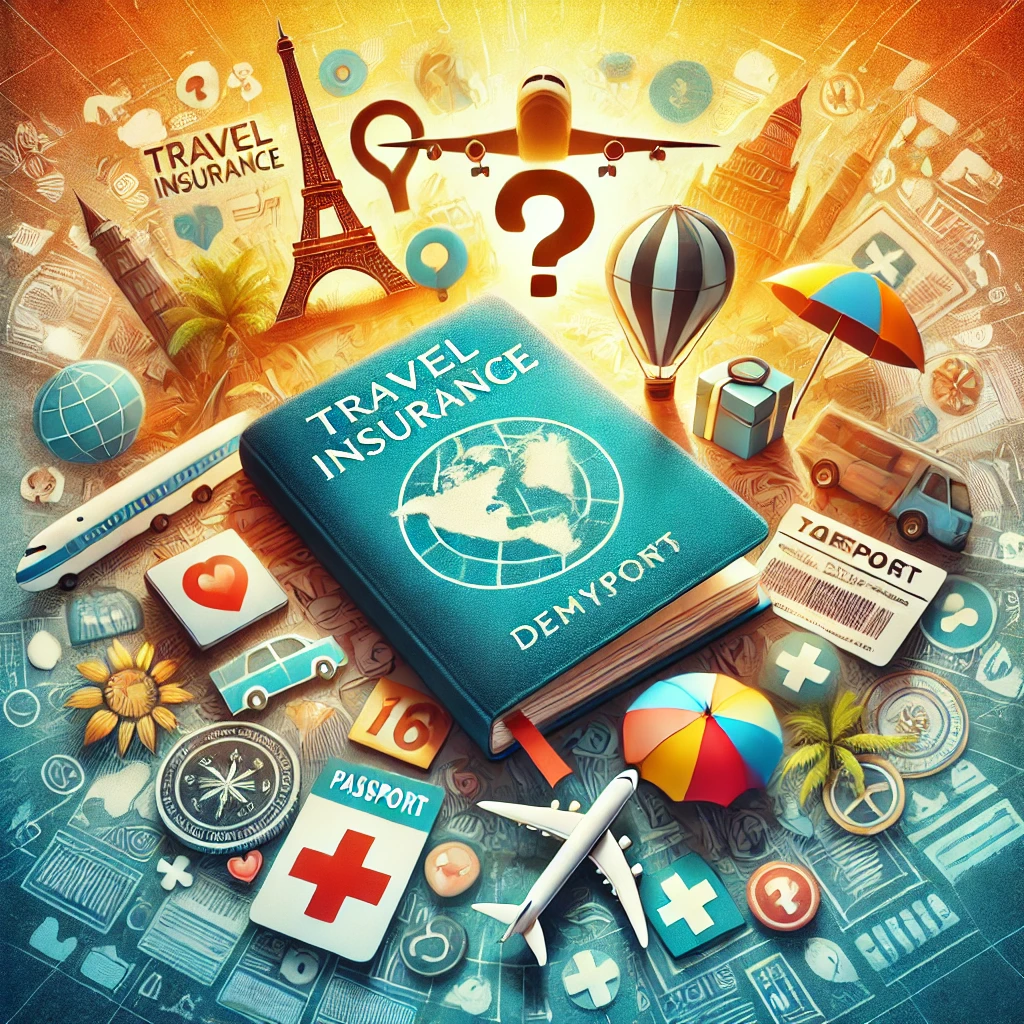1. How does travel insurance differ from other types of insurance like health or life insurance?
Travel insurance differs from health or life insurance in that it specifically covers unforeseen events that occur during a trip, such as trip cancellations, lost luggage, or medical emergencies abroad. Health insurance typically covers routine medical care and long-term health expenses, while life insurance provides financial support to beneficiaries upon the policyholder’s death. For example, if you get injured while on vacation, travel insurance can cover emergency medical costs, while your regular health insurance might not cover treatments abroad. Travel insurance is designed to address unique travel-related risks rather than ongoing medical or life coverage.
2. What factors should travelers consider when choosing the right travel insurance plan?
When choosing the right travel insurance plan, travelers should consider several key factors to ensure adequate protection. First, assess the coverage limits for medical emergencies, trip cancellations, and lost or delayed baggage, as these can significantly impact your finances if an incident occurs. Additionally, examine any exclusions in the policy, especially concerning high-risk activities like skiing or scuba diving, which may not be covered under standard plans. It’s also important to evaluate the insurer’s reputation for customer service and the claims process, as a straightforward claims experience can make a stressful situation more manageable. Travelers should also consider their trip duration and destination, as these can affect coverage needs and costs. For example, if you’re traveling to a remote location where medical care is limited, opting for a plan with higher medical evacuation coverage would be wise. Lastly, comparing multiple policies will help find the best value tailored to your specific travel circumstances.
3. What specific events or situations are generally not covered by standard travel insurance policies?
Standard travel insurance policies typically exclude coverage for several specific events or situations that travelers should be aware of. Common exclusions include pre-existing medical conditions, which are often not covered unless a waiver is purchased, and injuries or accidents resulting from high-risk activities like skydiving or extreme sports. Additionally, incidents arising from illegal activities, such as drug use or participation in unlawful events, are generally not covered. Natural disasters or political unrest occurring after the policy is purchased may also fall under exclusions if the insurer does not consider them to be “unforeseen.” Furthermore, travel disruptions due to a change in personal circumstances, such as job loss or family emergencies, are usually not covered. For instance, if a traveler has a known medical condition that flares up during the trip, any related medical expenses may not be reimbursed. Being aware of these exclusions helps travelers make informed decisions when selecting their insurance policy.
4. How does travel insurance protect travelers during medical emergencies in foreign countries?
Travel insurance provides crucial protection during medical emergencies in foreign countries by covering unexpected medical expenses that arise while traveling. This can include costs for hospital stays, emergency surgeries, and doctor visits, which can be significantly higher abroad than at home. Many policies also offer 24/7 emergency assistance services, helping travelers find local medical facilities and ensuring they receive appropriate care. Additionally, some plans cover medical evacuation, which is essential if a traveler needs to be transported to a better-equipped hospital or flown home for treatment. For example, if a traveler suffers a severe injury while hiking in a remote area, their travel insurance can cover the costs of medical evacuation and treatment, alleviating the financial burden. By having this coverage, travelers can focus on recovery rather than worrying about how to pay for unexpected medical bills. Overall, travel insurance acts as a safety net, ensuring that travelers receive necessary medical attention without incurring overwhelming expenses.
5. Can travelers purchase travel insurance after booking a trip, or is it necessary to buy it beforehand?
Travelers can purchase travel insurance after booking a trip, but it’s generally advisable to buy it beforehand to maximize coverage benefits. Many travel insurance policies offer time-sensitive benefits, such as coverage for pre-existing medical conditions or trip cancellation due to specific circumstances, which may only be available if the policy is purchased soon after the trip is booked. If a traveler waits too long, they could miss out on these important protections. For example, if someone books a trip to Europe and experiences an unexpected illness before their departure, having purchased insurance at the time of booking may allow them to recover non-refundable expenses. Additionally, purchasing insurance early can provide peace of mind, knowing that they are protected against unforeseen events that could impact their plans. While it’s possible to buy travel insurance closer to the departure date, doing so might limit the options and benefits available to the traveler.
6. How does travel insurance handle delays or cancellations caused by natural disasters or pandemics?
Travel insurance typically provides coverage for delays or cancellations caused by natural disasters or pandemics, but the specifics depend on the policy purchased. Many comprehensive plans include provisions for trip cancellations due to unforeseen natural disasters, such as hurricanes or earthquakes, allowing travelers to recoup non-refundable expenses like flights and accommodations. However, coverage for pandemics can vary significantly; some policies may include specific pandemic coverage, while others might exclude it altogether. For example, if a traveler’s flight is canceled due to a hurricane, their insurance could reimburse them for lost expenses. Conversely, if a new pandemic-related travel restriction is imposed after purchasing the insurance, the traveler would need to review their policy to determine if they’re eligible for coverage. It’s essential for travelers to read the fine print and ensure they understand how their specific policy addresses these situations, especially as the landscape of travel continues to evolve. Ultimately, having the right travel insurance can provide critical financial protection in the face of unexpected disruptions.
7. Are there special considerations for senior travelers or those with pre-existing medical conditions when buying travel insurance?
Yes, there are special considerations for senior travelers or those with pre-existing medical conditions when buying travel insurance. Many insurance providers have age-related restrictions or higher premiums for older travelers, as they may be perceived as higher risk due to potential health issues. Additionally, travelers with pre-existing medical conditions must carefully review policy details, as standard plans often exclude coverage for any medical issues related to those conditions unless a waiver is purchased. For example, a senior traveler with a history of heart problems may need to secure a policy specifically designed to cover pre-existing conditions to ensure any related medical emergencies during their trip are covered. It’s also crucial for seniors to consider the availability of adequate medical facilities at their destination and the extent of emergency evacuation coverage. By taking these factors into account, senior travelers can make informed decisions and ensure they have the necessary protection while traveling.
8. What are the benefits of buying annual travel insurance versus single-trip coverage?
Buying annual travel insurance offers several benefits over single-trip coverage, particularly for frequent travelers. One of the primary advantages is cost-effectiveness; purchasing an annual plan can be more economical than buying separate policies for multiple trips, especially if you travel several times a year. Additionally, annual travel insurance provides the convenience of automatic coverage for any trip taken within the policy period, eliminating the need to remember to purchase insurance each time you travel. This can be particularly beneficial for last-minute trips or spontaneous travel plans. For example, if a traveler plans three vacations in one year, an annual policy might cover all those trips for a single premium, compared to individual costs for each journey. Furthermore, annual plans often include comprehensive benefits such as trip interruption, emergency medical coverage, and luggage protection, providing peace of mind for frequent travelers. Overall, annual travel insurance caters to the needs of those who travel regularly, ensuring consistent protection without the hassle of re-purchasing coverage for each trip.
9. How does lost baggage insurance work, and what are the limits on compensation for lost or stolen items?
Lost baggage insurance provides compensation to travelers for lost, stolen, or damaged luggage and personal belongings while traveling. When a traveler’s baggage is lost or delayed, they can file a claim with their insurance provider, typically requiring proof of the loss, such as a report from the airline or a receipt for necessary purchases. The compensation limits can vary significantly between policies; many plans cap reimbursement for lost baggage at a specific amount per item and a total for the entire claim. For example, if a policy has a limit of $1,000 for lost luggage and $500 per item, and a traveler loses three items worth $200, $300, and $600, they would only receive $500 for the most valuable item. It’s essential to read the policy carefully, as some items, like jewelry or electronics, may have lower limits or be excluded altogether. By understanding the coverage limits and conditions, travelers can ensure they are adequately protected against the financial impact of lost baggage during their journeys.
10. What steps should travelers take if they need to file a claim with their travel insurance provider?
If travelers need to file a claim with their travel insurance provider, they should follow a systematic process to ensure a smooth and successful claim experience. First, they should promptly gather all necessary documentation, including receipts, police reports, and any correspondence related to the incident. It’s important to notify the insurance provider as soon as possible, as many policies have specific time limits for filing claims. For example, if a traveler’s luggage is lost, they should obtain a report from the airline and take note of their baggage claim number. After compiling the required documents, they should complete the claim form provided by the insurer, detailing the incident and attaching all relevant paperwork. Once submitted, travelers should keep copies of everything for their records and follow up with the insurer to check on the status of the claim. By taking these steps, travelers can help facilitate a timely resolution and maximize their chances of receiving the compensation they are entitled to under their policy.
11. What are the advantages of adding adventure sports coverage to a travel insurance policy for more adventurous trips?
Adding adventure sports coverage to a travel insurance policy provides essential protection for travelers participating in high-risk activities like skiing, scuba diving, or rock climbing. Standard travel insurance typically excludes coverage for injuries or accidents related to these activities, which could lead to significant out-of-pocket expenses if something goes wrong. By including this specialized coverage, travelers ensure they are protected against medical expenses, trip cancellations, or equipment losses resulting from adventure sports incidents. For example, if a traveler suffers an injury while paragliding, adventure sports coverage would help cover medical bills and any necessary evacuation costs. Additionally, this coverage often includes liability protection in case of accidents that harm others or damage property. Overall, having adventure sports coverage enhances peace of mind, allowing travelers to fully enjoy their thrilling experiences without the worry of potential financial repercussions.
12. How can travelers ensure they are adequately covered for trip cancellations due to unexpected events like illness or job loss?
To ensure adequate coverage for trip cancellations due to unexpected events like illness or job loss, travelers should take several key steps when purchasing travel insurance. First, they should choose a comprehensive policy that specifically includes trip cancellation coverage for a wide range of unforeseen circumstances, including illness, job loss, and family emergencies. It’s crucial to read the fine print to understand what qualifies as a covered reason for cancellation, as policies can vary significantly. Additionally, travelers may consider adding a “Cancel for Any Reason” (CFAR) option, which allows them to cancel their trip for reasons not explicitly covered by standard policies, typically for an additional premium. Furthermore, purchasing insurance shortly after booking the trip can help ensure that pre-existing conditions and other related issues are included in the coverage. For example, if a traveler falls ill shortly before departure and has a comprehensive policy with trip cancellation coverage, they can recoup non-refundable expenses. Lastly, keeping documentation, such as medical records or job loss notices, can facilitate the claims process if cancellation becomes necessary. By taking these precautions, travelers can enhance their protection against unexpected disruptions.
13. How does travel insurance handle issues like identity theft or fraud during a trip?
Travel insurance can provide important support in the event of identity theft or fraud during a trip, although the specific coverage may vary by policy. Many travel insurance plans include provisions for emergency assistance, which can help travelers respond quickly to incidents of identity theft. For example, if a traveler’s wallet is stolen and contains personal identification and credit cards, the insurance provider may offer services like emergency card replacement or assistance in contacting local authorities and financial institutions to report the theft.
Additionally, some travel insurance policies may provide coverage for certain financial losses incurred due to identity theft, such as unauthorized transactions on credit cards. However, it’s essential for travelers to thoroughly review their policy to understand the limits and exclusions related to identity theft coverage. To enhance their protection, travelers can take proactive steps, such as using travel wallets, keeping personal information secure, and regularly monitoring their accounts while on the road. Overall, while travel insurance may not cover all aspects of identity theft, it can offer valuable assistance in managing the situation effectively.
14. Is travel insurance worth the investment for short trips, or is it primarily useful for long journeys?
Travel insurance is worth the investment for short trips as well as long journeys. While many people associate travel insurance with extended vacations, short trips can also present unexpected risks that may result in significant financial losses. For instance, even a weekend getaway can be disrupted by factors such as trip cancellations due to illness, lost luggage, or emergency medical situations.
Investing in travel insurance can provide peace of mind, knowing that you’re protected against unforeseen events, regardless of the trip’s length. Short trips often have non-refundable expenses, such as flights and hotel bookings, which can lead to financial strain if plans change unexpectedly.
Moreover, many travel insurance policies offer affordable rates for shorter trips, making it a practical choice for travelers. In summary, whether traveling for a few days or several weeks, travel insurance is a valuable safeguard that can help mitigate potential losses and enhance the overall travel experience.
15. How do travel insurance policies vary by destination, and why does this matter?
Travel insurance policies can vary significantly by destination due to factors like local healthcare standards, potential travel risks, and regional regulations. For example, a policy for a trip to a remote area with limited medical facilities might have different medical evacuation coverage compared to one for a trip to a major city with well-established healthcare services. Insurance providers often assess the safety of a destination, taking into account the likelihood of natural disasters, political instability, or high crime rates, which can impact coverage options and premiums.
This variation matters because it directly affects the level of protection travelers receive. For instance, travelers heading to regions prone to hurricanes may need specific coverage for trip cancellations related to weather events, while those visiting countries with higher medical costs might require higher medical expense limits. Additionally, some destinations may have unique risks that necessitate specialized coverage, such as adventure sports or specific health considerations.
Understanding these differences ensures that travelers select appropriate policies tailored to their destinations, helping them feel secure and protected against unexpected incidents while traveling. Ultimately, being informed about how travel insurance varies by location enables travelers to make better decisions and avoid gaps in coverage.
16. How can travelers avoid common pitfalls or mistakes when purchasing travel insurance?
Travelers can avoid common pitfalls or mistakes when purchasing travel insurance by taking several proactive steps. First, it’s crucial to thoroughly read and understand the policy terms, including coverage limits, exclusions, and the specific reasons for trip cancellation. This helps prevent surprises later, especially regarding what is and isn’t covered.
Second, travelers should assess their unique needs based on the type of trip and activities planned. For example, if engaging in adventure sports, they should seek policies that include adventure sports coverage to avoid gaps in protection.
Additionally, comparing multiple policies can help travelers find the best coverage at the best price, as not all policies are created equal. It’s also advisable to purchase insurance soon after booking the trip, especially for comprehensive coverage that includes pre-existing conditions and other time-sensitive benefits.
Lastly, keeping documentation, such as receipts and medical records, can streamline the claims process in case something goes wrong. By being informed and diligent, travelers can ensure they choose a travel insurance policy that provides adequate protection and peace of mind throughout their journey.
Travel insurance plays a crucial role in protecting travelers from various risks associated with their trips, whether it’s unexpected medical emergencies, trip cancellations, or lost baggage. Understanding the distinctions between travel insurance and other insurance types is essential for making informed decisions, as is being aware of policy exclusions and variations based on destination. Special considerations for senior travelers and those with pre-existing conditions highlight the need for tailored coverage. Additionally, purchasing insurance promptly and considering options like adventure sports coverage can further enhance protection. Ultimately, by avoiding common pitfalls and understanding their coverage, travelers can ensure a worry-free experience on any journey.


